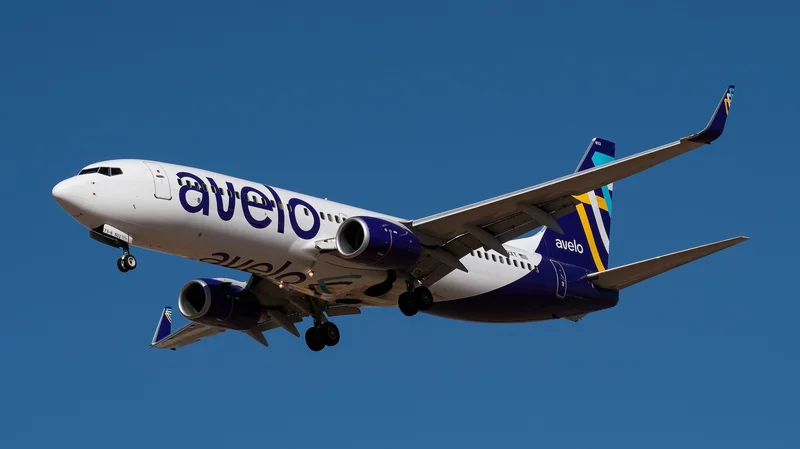Avelo Airlines: FAA Cuts and the Lakeland Linder Opportunity
Lakeland: The Unsung Hero of Air Travel's Next Chapter?
Okay, buckle up, folks, because something really interesting is brewing in the world of air travel, and it's happening in a place you might not expect: Lakeland, Florida. While the big boys like Orlando (MCO) and Tampa (TPA) are facing FAA-mandated flight cuts due to the ongoing government shutdown—a situation that, let's be honest, is a mess for everyone involved—Lakeland Linder International Airport is quietly positioning itself as a potential game-changer.
The FAA is ordering airlines to reduce flights by 10% at 40 major airports. Avelo Airlines, which operates out of Lakeland, is assessing how this impacts them. But here's the kicker: Lakeland's air traffic control tower is staffed by RVA Robinson Aviation, a company on contract with the FAA. And that contract? Untouched by the shutdown. So, while Orlando and Tampa are scrambling, Lakeland's controllers are still on the job, ready to roll.
Think about the implications for a second. In a world increasingly reliant on seamless travel, where even a minor disruption can cause a ripple effect, having a fully operational airport nearby is, well, it’s a lifeline. Kris Hallstrand, Lakeland Linder's airport director, confirmed they're in close contact with Avelo, exploring how they can help mitigate the impact of the airspace reduction. “We are working to make ourselves available as an alternative airport at this time," she said. This isn't just about convenience; it's about resilience. Could FAA cuts to Orlando, Tampa airports result in more Avelo flights to Lakeland Linder?

It's like when Gutenberg invented the printing press. Suddenly, information wasn't just for the elite; it was democratized, accessible to the masses. What's happening in Lakeland isn’t quite that revolutionary, but the underlying principle is the same: decentralization and redundancy create strength. The TSA officers at Lakeland, who operate out of Tampa International Airport, haven't been paid since the shutdown began. Despite this, "they have kept a smile on their face through all of this even though they are not getting paid," Hallstrand said. "They don’t want the passengers' safety to suffer because of the shutdown." It's a reminder that even in the face of adversity, human dedication can make all the difference. What if Lakeland becomes the example of how smaller airports can step up to alleviate pressure on larger hubs, not just during crises, but as a matter of course?
Now, of course, there are challenges. We don't know how long these FAA cuts will last, or whether they'll impact Thanksgiving travel, which is traditionally one of the busiest times of the year. And exact details on how this could impact the number of flights in or out of Lakeland Linder were not available as of Nov. 6. But what is clear is that Lakeland is ready to step up. And this is the kind of story that reminds me why I got into this field in the first place.
Lakeland: A Glimpse of a More Resilient Future?
So, what does this all mean? It means we need to start thinking differently about air travel infrastructure. It's not just about bigger is better. It's about smarter, more agile, and more distributed. Lakeland's situation offers us a glimpse into a future where smaller airports play a crucial role in maintaining the flow of people and goods, even when the system is under stress. This is not just about aviation; it's about how we build resilience into all our critical systems. And it's a future I, for one, am incredibly excited to see unfold.
-

Warren Buffett's OXY Stock Play: The Latest Drama, Buffett's Angle, and Why You Shouldn't Believe the Hype
Solet'sgetthisstraight.Occide...
-

The Business of Plasma Donation: How the Process Works and Who the Key Players Are
Theterm"plasma"suffersfromas...
-

The Great Up-Leveling: What's Happening Now and How We Step Up
Haveyoueverfeltlikeyou'redri...
-

NJ's ANCHOR Program: A Blueprint for Tax Relief, Your 2024 Payment, and What Comes Next
NewJersey'sANCHORProgramIsn't...
-

The Future of Auto Parts: How to Find Any Part Instantly and What Comes Next
Walkintoany`autoparts`store—a...
- Search
- Recently Published
-
- Stock Market 'News': Today's US Market Spin and the 'Live' Updates
- IRS Direct Deposit Relief Payments: What This Breakthrough Means for Your Financial Prosperity
- Bilbao: What the Data Reveals
- Outback Steakhouse Closures: The Financials Behind the Shutdown and Which Locations Are Gone
- The Burger Bubble Just Popped: Why Your Go-To Spot is Next on the Chopping Block
- The Bio-Hacked Human: What the New Science of the Core Reveals About Our Future
- Ore: What It Is and Why It Matters
- Firo: What is it?
- Avelo Airlines: FAA Cuts and the Lakeland Linder Opportunity
- Rocket Launch Today: What Happened and the Mystery Fireball
- Tag list
-
- Blockchain (11)
- Decentralization (5)
- Smart Contracts (4)
- Cryptocurrency (26)
- DeFi (5)
- Bitcoin (29)
- Trump (5)
- Ethereum (8)
- Pudgy Penguins (5)
- NFT (5)
- Solana (5)
- cryptocurrency (6)
- XRP (3)
- Airdrop (3)
- MicroStrategy (3)
- Stablecoin (3)
- Digital Assets (3)
- PENGU (3)
- Plasma (5)
- Zcash (6)
- Aster (4)
- investment advisor (4)
- crypto exchange binance (3)
- bitcoin price (3)
- SX Network (3)
